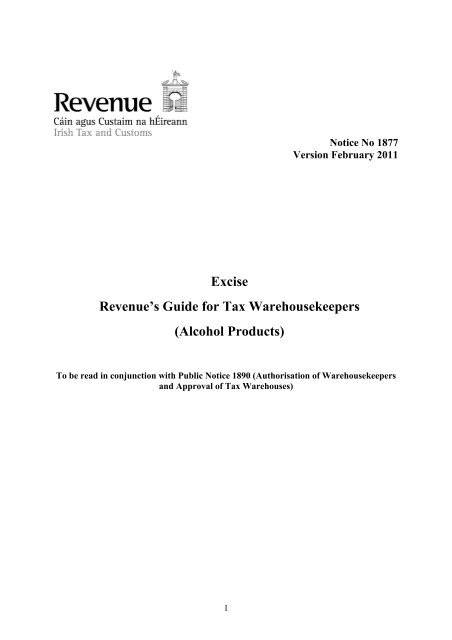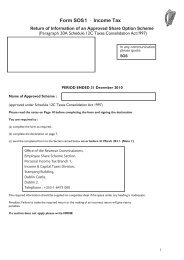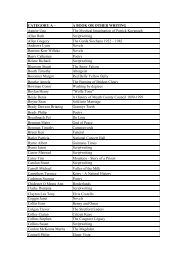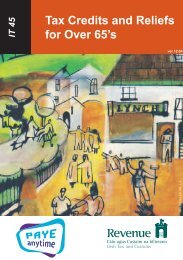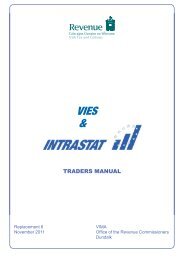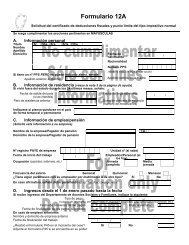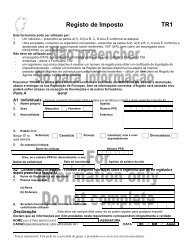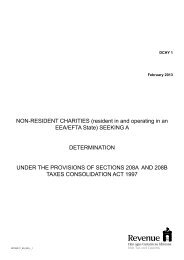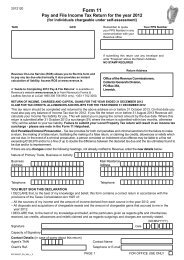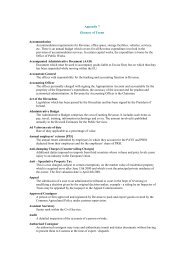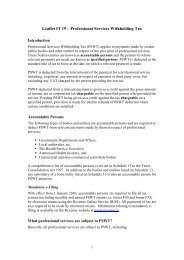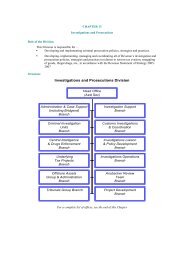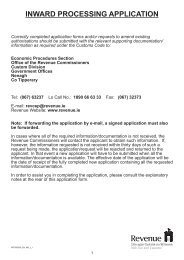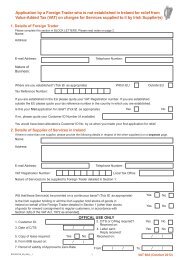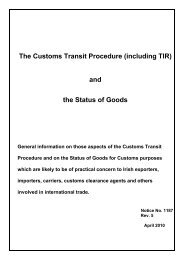Notice No. 1877 - Excise - Revenue Commissioners
Notice No. 1877 - Excise - Revenue Commissioners
Notice No. 1877 - Excise - Revenue Commissioners
Create successful ePaper yourself
Turn your PDF publications into a flip-book with our unique Google optimized e-Paper software.
<strong><strong>No</strong>tice</strong> <strong>No</strong> <strong>1877</strong><br />
Version February 2011<br />
<strong>Excise</strong><br />
<strong>Revenue</strong>’s Guide for Tax Warehousekeepers<br />
(Alcohol Products)<br />
To be read in conjunction with Public <strong><strong>No</strong>tice</strong> 1890 (Authorisation of Warehousekeepers<br />
and Approval of Tax Warehouses)<br />
1
Table of Contents<br />
1 Introduction 5<br />
2 Legislation 5<br />
3 <strong>Excise</strong> Licences 6<br />
4 <strong>Excise</strong> Duty Rates 7<br />
5 Enquiries and Assistance 7<br />
6 Warehousekeeper’s Responsibilities 7<br />
7 SEED Registration 8<br />
8 EMCS 8<br />
9 Opening Hours 9<br />
10 Requirements in Respect of Records 9<br />
11 Stock Returns 10<br />
12 Storage (Holding) of Goods 10<br />
12.1 Storage of Duty Suspended and Duty Paid Goods 10<br />
12.2 Operations in Storage and Distribution Warehouse 10<br />
13 <strong>Revenue</strong> Controls. 11<br />
14 Movement of Excisable Goods 11<br />
14.1 Receipts 11<br />
14.1.1 Receipt of Goods into Warehouse.............................................................. 11<br />
14.1.2 Receipt of Goods From Other Tax Warehouses in the State ..................... 12<br />
14.1.3 Receipt of Goods From Other Member States........................................... 12<br />
14.1.4 Goods Arriving Without an e-AD.............................................................. 13<br />
14.1.5 Receipt of Goods from 3rd Countries ........................................................ 13<br />
14.1.6 Receipt of Tax Relieved Alcohol............................................................... 13<br />
14.1.7 Examination of Consignments ................................................................... 14<br />
14.2 Deliveries from Warehouse - General 14<br />
14.2.1 Purposes for Which Goods May be Delivered From a Warehouse. .......... 14<br />
2
14.2.2 General Delivery Procedures ..................................................................... 14<br />
14.3 Deliveries for Home Consumption 15<br />
14.3.1 Daily/Monthly Return ................................................................................ 15<br />
14.3.2 Home Consumption (HC) Warrants - C&E 1115 ...................................... 15<br />
14.3.3 Charging of VAT ....................................................................................... 16<br />
14.3.4 Guarantee for Deferred Payment of Duty .................................................. 17<br />
14.4 Deliveries under Duty Suspension in the State 17<br />
14.4.1 Deliveries to Other Warehouse - General Requirements........................... 17<br />
14.4.2 Return of Excisable Products to Dispatching Warehouse.......................... 18<br />
14.4.3 Deliveries to Exempt Consignees in the State ........................................... 18<br />
14.5 Deliveries Under Duty Suspension to Other Member States (OMS) 19<br />
14.6 Exports to 3rd Countries 19<br />
14.6.1 General Requirements................................................................................ 19<br />
14.6.2 Direct Export via OMS Using EU Transit Procedure................................ 20<br />
14.6.3 Indirect Export via OMS Without Use of the EU Transit Procedure......... 20<br />
14.6.4 Export Control System (ECS).................................................................... 20<br />
14.7 Other Duty Suspended Deliveries 20<br />
14.7.1 General Requirements................................................................................ 21<br />
14.7.2 Deliveries of Ships’ Stores......................................................................... 21<br />
14.7.3 Deliveries for Aircraft Supplies ................................................................. 21<br />
14.7.4 Deliveries to Duty-Free Shops ................................................................... 22<br />
14.7.5 Deliveries to Exempt Consignees in Other Member States ....................... 22<br />
14.7.6 Deliveries of Tax Relieved Alcohol........................................................... 22<br />
15 Manufacturing & Processing in Tax Warehouses 23<br />
15.1 Operations Allowed on Alcoholic Products 23<br />
15.2 <strong><strong>No</strong>tice</strong> of Operations 23<br />
15.3 Warehousekeeper’s Responsibilities 23<br />
15.4 Methods for measuring strength of spirits 24<br />
15.5 Bottling Tolerances 25<br />
15.6 Sampling 25<br />
15.6.1 General Requirements................................................................................ 25<br />
15.6.2 Records to be Kept of Samples Taken ....................................................... 26<br />
15.6.3 Disposal of Duty Free Samples.................................................................. 26<br />
15.7 Issue of ‘Certificates of Age’ 26<br />
15.8 Monthly Report on Operations 27<br />
16 Losses/Destructions 27<br />
16.1 Introduction 27<br />
16.2 Payment 27<br />
16.3 Losses During Storage in Warehouse 27<br />
16.4 Losses During Movement Within the State 28<br />
3
16.5 Losses During Intra-Community Movement 29<br />
16.5.1 General Provisions ..................................................................................... 29<br />
16.5.2 Losses Where an Irregularity is Involved. ................................................. 29<br />
16.6 Losses During Manufacturing/Processing 30<br />
16.7 Destructions 30<br />
16.8 Home Consumption Warrant (Special) 31<br />
17 Repayments 31<br />
18 Administrative Penalties 31<br />
19 Appeals 32<br />
20 List of Appendices 33<br />
4
1 Introduction<br />
This <strong><strong>No</strong>tice</strong> provides information on the operation of premises approved by <strong>Revenue</strong> as tax<br />
warehouses (General Storage and Distribution, Facilitation, and Operations), with the<br />
exception of mineral oil warehouses, breweries, distilleries and tobacco warehouses.<br />
It explains <strong>Revenue</strong>’s requirements for the manufacture, holding, and movement of excisable<br />
products to and from the tax warehouse under duty suspension, both within the State and the<br />
European Union (EU).<br />
This <strong><strong>No</strong>tice</strong> is relevant to persons who:<br />
• Are already, or are planning to become, an authorised warehousekeeper, either as the<br />
proprietor (that is, a person who for the time being has possession or control of a tax<br />
warehouse) or a tenant (that is, a person who has been accepted by the proprietor as a<br />
tenant in the proprietor’s tax warehouse);<br />
• Wish to put excisable goods into warehouse or remove excisable goods from<br />
warehouse;<br />
• Wish to process spirits, or other manufactured alcoholic beverages;<br />
• Wish to carry out operations on warehoused excisable products.<br />
This <strong><strong>No</strong>tice</strong> should be read in conjunction with the following Public <strong><strong>No</strong>tice</strong>s:<br />
Public <strong><strong>No</strong>tice</strong> 1890: <strong>Excise</strong>: Authorisation of Warehousekeepers and Approval of Tax<br />
Warehouses.<br />
Public <strong><strong>No</strong>tice</strong> 1880: <strong>Excise</strong>: Import of Excisable Products from EU Member States for<br />
commercial purposes.<br />
Public <strong><strong>No</strong>tice</strong> 1886: <strong>Excise</strong>: Alcohol Products Tax.<br />
Public <strong><strong>No</strong>tice</strong> 1887: Receipt and use of denatured and undenatured alcohol products.<br />
2 Legislation<br />
The EU law for the general arrangements for excisable products is set down in Council<br />
Directive 2008/118/EC of 16 December, 2008 (The Directive) which applied with effect<br />
from 1 April, 2010. Production, processing and holding of excisable products in a tax<br />
warehouse are covered by Chapter III of that Directive, and intra EU movement of excisable<br />
products under duty-suspension is covered by Chapter IV.<br />
The national provisions for the general arrangements for excise duties are in Part 2 of the<br />
Finance Act, 2001, which has been substantially amended by the Finance Act 2010. All<br />
references in this Guide to sections are, unless otherwise stated, to sections of that Part.<br />
Section 108A of that act covers production, processing and holding in a tax warehouse, and<br />
Section 109 provides for the authorisation of warehousekeepers and the approval of tax<br />
5
warehouses, subject to conditions on any authorisation granted, breach of which is an offence<br />
under Section 121.<br />
Chapter 1 of Part 2 of the Finance Act 2003 sets down the charging provisions, rates, and<br />
tax requirements for Alcohol Products Tax .<br />
The Alcohol Products Tax Regulation 2004 (S.I. <strong>No</strong>. 379 of 2004) sets down requirements<br />
and procedures to be followed in the tax warehouse.<br />
Section 136 provides that authorised Officers of the <strong>Revenue</strong> <strong>Commissioners</strong> may at any time<br />
enter premises and may there make enquiries and take samples, require the production of<br />
books, accounts and records, and inspect, take extracts from, copy, or remove records relating<br />
to products chargeable with excise duty. It is an offence, under Section 123 to refuse to give<br />
information or to give false information to an Officer or to obstruct or impede an Officer<br />
exercising powers under the Act.<br />
A person convicted of a summary offence under these provisions is liable to a penalty of<br />
€5,000.<br />
Part 47, Chapter 4 of the Taxes Consolidation Act 1997 makes it an offence for a person to<br />
knowingly deliver to the <strong>Revenue</strong> <strong>Commissioners</strong> incorrect returns, statements or accounts, to<br />
knowingly produce incorrect receipts, invoices or other documents, or, to knowingly claim<br />
exemptions or reliefs to which the person is not entitled.<br />
Section 1078 (3) of the Taxes Consolidation Act 1997 provides that persons convicted of an<br />
indictable offence under these provisions shall be liable to fines of up to €126,970 and/or a<br />
maximum of five years imprisonment.<br />
Section 119, of the Finance Act 2001, makes it an offence for any person to directly or<br />
indirectly fraudulently evade, or attempt to evade, excise duty. A person convicted of an<br />
indictable offence under these provisions shall be liable to a penalty of three times the value<br />
(including all taxes) of the excisable products concerned, or €126,970, whichever is the<br />
greater, and/or a maximum of 5 years imprisonment.<br />
3 <strong>Excise</strong> Licences<br />
A warehousekeeper involved in the wholesaling of alcoholic products requires a Dealer’s<br />
Licence. Different types of dealers’ licences may apply depending on the nature of the trade,<br />
e.g. wine/beer/spirits. These licences are issued by the National <strong>Excise</strong> Licence Office,<br />
(NELO), Waterford.<br />
A warehousekeeper involved in manufacturing excisable product requires the appropriate<br />
Manufacturer’s Licence. A Manufacturer’s Licence authorises the holder to act as a wholesale<br />
dealer at the premises where the product is manufactured.<br />
For further information on excise licences, please refer to <strong>Revenue</strong>’s Guide to <strong>Excise</strong><br />
Licences available on its website via the following link:<br />
6
http://www.revenue.ie/en/tax/excise/leaflets/guide-to-excise-licences.pdf<br />
4 <strong>Excise</strong> Duty Rates<br />
The excise duty rates applicable to excisable products are published on the <strong>Revenue</strong> website,<br />
see notice on <strong>Excise</strong> Duty Rates via the following link:<br />
http://www.revenue.ie/en/tax/excise/duties/excise-duty-rates.html<br />
5 Enquiries and Assistance<br />
Further advice in relation to any aspect of this <strong><strong>No</strong>tice</strong> can be obtained by contacting the<br />
appropriate <strong>Revenue</strong> Office using the following link:<br />
http://www.revenue.ie/en/contact/index.html<br />
6 Warehousekeeper’s Responsibilities<br />
A proprietor warehousekeeper is a person who for the time being has possession or control<br />
of a tax warehouse.<br />
A tenant warehousekeeper is a person who has been accepted by a proprietor as a tenant in<br />
the proprietor’s tax warehouse<br />
<strong>No</strong>tes<br />
References in this notice to warehousekeepers should be taken to refer to proprietor<br />
warehousekeepers. Tenant warehousekeepers will be specifically referred to where<br />
appropriate.<br />
References in this <strong><strong>No</strong>tice</strong> to the warehousekeeper’s authorisation should be taken to<br />
include the warehouse approval where this is appropriate, i.e. for a proprietor<br />
warehousekeeper.<br />
Further details on the Authorisation of Warehousekeepers and the Approval of Tax<br />
Warehouses can be found in Public <strong><strong>No</strong>tice</strong> 1890.<br />
The authorised warehousekeeper is responsible for controlling the warehouse and the<br />
activities within it. The warehousekeeper is at all times responsible for the duty on all<br />
exciseable products in the warehouse, including product held by tenant warehousekeepers in<br />
the warehouse, and must provide the bond to cover the excise duty on the products held.<br />
The warehousekeeper must ensure that the goods in the warehouse are safeguarded and<br />
properly and fully accounted for. It is expected that effective management controls will be in<br />
7
place to ensure that the accounting systems and physical checks required to comply with the<br />
warehousekeeper’s authorisation are being maintained. The warehousekeeper should also<br />
have appropriate security systems and procedures in place that are designed to ensure there is<br />
no unauthorised access to any part of the approved premises. These should be maintained and<br />
reviewed periodically.<br />
The warehousekeeper must:<br />
• Take effective measures to safeguard excisable goods in the warehouse;<br />
• Raise all accounts accurately and promptly;<br />
• Maintain satisfactory records of all goods in the warehouse;<br />
• Control all operations, receipts and deliveries;<br />
• Verify physical stock in warehouse by regular partial stock checks, and a complete<br />
stocktaking at least once every twelve months;<br />
• Prepare, discharge and retain a copy of all official documentation pertaining to<br />
operations, deliveries and receipts;<br />
• Examine all losses critically and take full responsibility for same;<br />
• Immediately investigate and report any indication of irregularity;<br />
• Submit stock returns and schedules as specified in this notice and in the authorisation<br />
document; and<br />
• Provide and maintain such appliances and facilities as are reasonably required to enable<br />
<strong>Revenue</strong> Officers to take any account or to examine goods, or to perform other duties at<br />
the warehouse.<br />
7 SEED Registration<br />
Before operations commence in a warehouse, the premises must be registered on the SEED<br />
database (System for the Exchange of <strong>Excise</strong> Data).<br />
This database contains details of all authorised warehousekeepers, tax warehouses and<br />
registered consignees in each EU Member State that are approved to dispatch and/or receive<br />
duty suspended excise products. If confirmation of the status of a trader is required you may<br />
contact <strong>Revenue</strong>, see par 5.<br />
Further information on SEED can be found on the Europa website via the following link:<br />
http://ec.europa.eu/taxation_customs/dds2/seed/seed_home.jsp?Lang=en&redirectionDate=20<br />
110120<br />
8 EMCS<br />
Since 1st January 2011, all intra-EU consignments of exciseable products under duty<br />
suspension must be carried out under the <strong>Excise</strong> Movement Control System (EMCS). All<br />
authorised warehousekeepers and other traders involved in intra-EU movement of duty<br />
suspended excise products must be capable of issuing and receipting an e-AD (electronic<br />
Administrative Document)<br />
8
These economic operators must interface with <strong>Revenue</strong> using open market web services. For<br />
this purpose, <strong>Revenue</strong> utilises the same IT interface strategy as the Customs Automated Entry<br />
System (AEP). Communications between traders and the <strong>Revenue</strong> EMCS application will be<br />
through the <strong>Revenue</strong> On-line System (ROS).<br />
To interact correctly with EMCS, traders must ensure that they have the appropriate<br />
registration with ROS. Further information can be found in the EMCS ROS User Guide<br />
available on the <strong>Revenue</strong> website via the following link:<br />
http://www.revenue.ie/en/tax/excise/emcs/emcs-ros-user-guide.doc<br />
9 Opening Hours<br />
The opening hours of the warehouse are at the warehousekeeper’s discretion. Appropriate<br />
security arrangements, Health and Safety and management systems must be in operation<br />
during these hours.<br />
10 Requirements in Respect of Records<br />
All records relating to excisable goods must be kept for a period of six years, or such lesser<br />
period as may be advised by <strong>Revenue</strong>. The warehousekeeper’s records should incorporate<br />
clear audit trails.<br />
These records, including returns and accounts of any authorised warehousekeepers who are<br />
tenants of the tax warehouse concerned, must be made available to <strong>Revenue</strong> on request. The<br />
records must be kept either at the registered place of business, or tax warehouse of the<br />
warehousekeeper, or at such other place as <strong>Revenue</strong> may allow.<br />
Great importance is attached to the standard of stock control and management in warehouses.<br />
Stock records are required for all alcohol products produced in, received into, held in and<br />
delivered from the tax warehouse. A stock account is required under Regulation 24 of the<br />
Alcohol Products Tax Regulations 2004 (S.I. <strong>No</strong>. 379 of 2004), and Schedule 3 to those<br />
Regulations specifies other records that are required to be kept.<br />
Upon application to <strong>Revenue</strong>, a warehousekeeper may be authorised to produce records in a<br />
particular format, or, for example, on company stationary. Official requirements in this regard<br />
are set out in Regulation 21 of the Alcohol Products Tax Regulations 2004 (S.I. <strong>No</strong>. 379 of<br />
2004).<br />
While the precise format of these records may vary, stock accounts must contain all the<br />
information needed for <strong>Revenue</strong> purposes. Appendix 1 sets out general requirements, which<br />
are in line with good commercial practice. If for any reason, location-based details cannot be<br />
provided in the stock account, this may be allowed, on application to <strong>Revenue</strong>, provided that<br />
all goods in warehouse can be produced on demand.<br />
9
11 Stock Returns<br />
A certified summary stock return must be completed and submitted to <strong>Revenue</strong> on a monthly<br />
basis by a warehousekeeper. The return, and, if required, any supporting schedules, should be<br />
submitted within 5 working days of the end of the month to which they refer. In the case of<br />
returns in respect of the production of beer and cider, the deadline is the 10 th working day of<br />
the month. Separate returns are required for each major category of goods in warehouse, as<br />
per <strong>Excise</strong> Reference Number (ERN).<br />
The ERN codes for alcohol products are listed in Appendix 2 to <strong><strong>No</strong>tice</strong> 1886 on Alcohol<br />
Products Tax available on <strong>Revenue</strong>’s website via the following link:<br />
http://www.revenue.ie/en/tax/excise/leaflets/pn1886.pdf<br />
While <strong>Revenue</strong> reserves the right to require that stock returns be submitted on a prescribed<br />
form, they will normally be accepted in the form of computerised printouts, or other<br />
electronic format, provided they contain all the relevant data specified in Appendix 2.<br />
Each stock return must be signed by the proprietor of the tax warehouse or by a person<br />
authorised to sign on behalf of that proprietor as being true and complete and to represent the<br />
actual stock in warehouse. A director or company secretary, or any person authorised by<br />
them, may sign on behalf of a company.<br />
Sole responsibility rests with the authorised warehousekeeper to ensure that the appropriate<br />
person signs such stock returns.<br />
12 Storage (Holding) of Goods<br />
12.1 Storage of Duty Suspended and Duty Paid Goods<br />
Duty suspended and duty paid goods must always be stored in separate locations. The<br />
warehousekeeper’s authorisation will state the area of the premises approved for the storage<br />
of duty suspended goods. Duty paid goods may not be stored in the duty suspended (bonded)<br />
area. Duty suspended goods may not be stored, even for short periods, in any area outside the<br />
bonded area.<br />
<strong>Revenue</strong> may require that the bonded area be physically identified by means of a line painted<br />
on the warehouse floor. In certain circumstances it may be required that the duty suspended<br />
area be physically separated from the rest of the premises, e.g. by means of a wall or wire<br />
mesh. Any such specific requirements will be advised to the warehousekeeper in the<br />
warehouse approval process.<br />
12.2 Operations in Storage and Distribution Warehouse<br />
The following operations may be allowed on application to <strong>Revenue</strong>:<br />
10
• Adjusting, repackaging and dividing cased goods (including damaged cases);<br />
• Re-labelling bottles; and<br />
• Re-marking or re-numbering packages, including repacked packages.<br />
13 <strong>Revenue</strong> Controls.<br />
<strong>Revenue</strong> has a responsibility to ensure that where a liability arises, the proper taxes are paid<br />
on excisable products. To meet this responsibility, <strong>Revenue</strong> exercise varying degrees of<br />
control over the production, warehousing, delivery from warehouse and movement of<br />
excisable goods on which the duty has not been paid. <strong>Revenue</strong> will carry out checks to ensure<br />
that the warehousekeeper is complying with obligations as defined in the law, in this <strong><strong>No</strong>tice</strong>,<br />
and in the warehousekeepers authorisation.<br />
The main focus of official control of the warehouse will be periodic visits to verify returns<br />
and declarations, combined with audits of stock records, accounting systems and stock<br />
challenges.<br />
<strong>Revenue</strong> will normally make a prior appointment when it is intended to undertake an audit,<br />
and would expect that the warehousekeeper will make available any records that may be<br />
required. Warehousing facilities provided for individual tenants are also subject to<br />
examination by <strong>Revenue</strong>. This may be done in the context of an audit of the specific tenant, or<br />
in order to verify details contained in the warehouse records.<br />
Verification visits may be made without notice by <strong>Revenue</strong> Officers to ensure that the<br />
warehousekeeper is complying with all obligations arising. These visits will usually involve<br />
physical inspections of particular areas of the warehousekeeper’s business and may include<br />
stock checks.<br />
It is a condition of the warehousekeeper’s authorisation that accommodation and other<br />
facilities are provided for <strong>Revenue</strong> staff when they call to the premises, and that all necessary<br />
assistance is afforded to such staff in the performance of their duties.<br />
14 Movement of Excisable Goods<br />
14.1 Receipts<br />
14.1.1 Receipt of Goods into Warehouse<br />
When goods are received into warehouse, the warehousekeeper must:<br />
• Inspect vehicles to confirm that they are secure on arrival. Check that locks and seals, if<br />
fitted, are intact and that the identifying numbers of the seals agree with those advised;<br />
11
• Make a thorough external examination of all containers, casks, and packages;<br />
• Deposit goods in warehouse without delay;<br />
• Be satisfied as to the quantities received;<br />
• Investigate any deficiencies, or any indication of interference and keep a record thereof;<br />
• Record the goods in the arrivals book (sample page Appendix 3) and stock account on<br />
the basis of the actual quantity received;<br />
• Issue a certificate of receipt to the warehouse of dispatch;<br />
• Ensure that the goods are adequately described in documents and on labels.<br />
<strong>Revenue</strong> reserves the right to examine incoming goods. Advance notice of consignments may<br />
be required to be provided to <strong>Revenue</strong> during a stated period. In such cases the<br />
warehousekeeper may be asked to hold the consignments unopened for a specified time.<br />
All supporting documentation relating to goods received into warehouse must be retained for<br />
a period of six years, or such lesser period as may be advised by <strong>Revenue</strong>.<br />
14.1.2 Receipt of Goods From Other Tax Warehouses in the State<br />
Form C&E 1116 is the relevant document used by <strong>Revenue</strong> to control the movement of<br />
excisable product and should be completed in triplicate. Copies 2 and 3 should accompany the<br />
goods from the dispatching warehouse.<br />
• The warehousekeeper should endorse copies 2 and 3 with details of the goods received;<br />
• The actual quantities received should be specified and any discrepancies between the<br />
amount advised and that received should be endorsed on the C&E1116. If there is any<br />
indication that a deficiency has arisen due to an irregularity such as theft, a report to this<br />
effect should accompany Copy 3 when being returned to the dispatching<br />
warehousekeeper;<br />
• Copy 2 of the document should be retained and filed;<br />
• Copy 3 should be returned to the warehousekeeper of dispatch;<br />
• A record must be kept of all losses/discrepancies. Any correspondence relating to<br />
losses/discrepancies between the warehousekeeper and suppliers or insurers should be<br />
retained.<br />
14.1.3 Receipt of Goods From Other Member States<br />
Under the <strong>Excise</strong> Movement Control System (EMCS), the responsibility for EMCS<br />
procedures on receipt of a consignment of goods under duty suspension rests with the<br />
warehousekeeper who is the designated consignee for the goods. This responsibility includes:<br />
• Submitting a report of receipt as soon as the goods received into the warehouse have<br />
been input to the warehouse system. In order to discharge the movement guarantee the<br />
report of receipt must be submitted within 5 days of receipt of the goods.<br />
• Ensuring that any discrepancies, damages, shortages or excesses are included on the<br />
report of receipt;<br />
• The warehousekeeper must inform the <strong>Revenue</strong> Officer of any serious irregularities in<br />
relation to the receipt of goods. The Officer will investigate any major shortages or<br />
excesses.<br />
12
For further information see the EMCS Trader Guide available on the <strong>Revenue</strong> website via<br />
the following link:<br />
http://www.revenue.ie/en/tax/excise/emcs/emcs-trader-guide.doc<br />
14.1.4 Goods Arriving Without an e-AD<br />
If a consignment of goods under duty suspension arrives without the required e-AD cover<br />
(or appropriate fallback document), the warehousekeeper should immediately advise<br />
<strong>Revenue</strong>. The goods should be entered in the warehouse accounts as a warehouse receipt<br />
and the dispatching warehousekeeper must be advised to submit an e-AD immediately.<br />
Excisable products travelling without valid cover are liable to forfeiture. The<br />
warehousekeeper should ensure that the dispatching warehousekeeper adheres to the<br />
proper EMCS procedures for any future deliveries.<br />
14.1.5 Receipt of Goods from 3rd Countries<br />
Excisable goods must be declared to Customs at the point of arrival in the State using the<br />
Single Administrative Document (SAD). The goods must be declared for tax warehousing on<br />
the AEP system, and any liability to Customs duty must be paid or secured on the AEP<br />
system at this point.<br />
Form C&E 1021 is the relevant document used by <strong>Revenue</strong> to control the movement of<br />
exciseable product and must be completed requesting that the goods be moved to the relevant<br />
warehouse. Financial security in the form of a bond must be in force to secure the duty on the<br />
goods during the movement. The C&E 1021 and a copy of the SAD should accompany the<br />
goods from the point of importation to the warehouse and be retained by the<br />
warehousekeeper.<br />
The warehousekeeper must return a receipted copy of the C&E 1021 to the appropriate<br />
Customs Office at the import station. A further copy of the C&E 1021 must be provided to<br />
<strong>Revenue</strong>.<br />
For further information please consult <strong>Revenue</strong>’s guide to Customs Import Procedures<br />
available on the <strong>Revenue</strong> website via the following link:<br />
http://www.revenue.ie/en/customs/leaflets/import-procedures-guide.pdf<br />
14.1.6 Receipt of Tax Relieved Alcohol<br />
Alcohol is exempt from excise duty throughout the EU when it has been rendered unfit for<br />
human consumption by an EU approved procedure for completely denaturing the alcohol. The<br />
EU approved denaturants, which are employed in each Member State for the purposes of<br />
completely denaturing alcohol are described in the Annex to Commission Regulation (EC) <strong>No</strong><br />
3199/93. The Regulation is reproduced at Appendix 3 of Public <strong><strong>No</strong>tice</strong> 1887 – Receipt and<br />
Use of Denatured and Undenatured Alcohol Products available on the <strong>Revenue</strong> website<br />
via the following link:<br />
13
http://www.revenue.ie/en/tax/excise/leaflets/pn1887.pdf<br />
Bulk consignments of completely denatured alcohol are not subject to the procedures for<br />
consignment under duty-suspension, and are instead to be consigned under cover of the<br />
simplified accompanying document and under the procedures that apply to consignments of<br />
duty-paid excisable products.<br />
Any alcohol product that has been denatured in any way other than the approved<br />
procedures for complete denaturing is, however, subject to the requirements for<br />
consignment under duty-suspension.<br />
14.1.7 Examination of Consignments<br />
When a <strong>Revenue</strong> Officer decides to examine a particular consignment(s), the<br />
warehousekeeper will be informed to hold the consignment(s) intact for examination for a<br />
period of two hours from the agreed time of examination.<br />
14.2 Deliveries from Warehouse - General<br />
14.2.1 Purposes for Which Goods May be Delivered From a Warehouse.<br />
In accordance with the terms of a warehousekeeper’s authorisation, goods may be delivered<br />
for the following purposes:<br />
• Home consumption on payment of duty;<br />
• Under duty suspension to:<br />
Other tax warehouses in the State and in other Member States;<br />
Registered consignees and temporary registered consignees in other EU<br />
Member States;<br />
Duty-free shops;<br />
Ships as stores;<br />
In-flight catering;<br />
<br />
<br />
Diplomatic privilege;<br />
Other duty free uses, e.g. used in denatured product, medicinal product or<br />
used in scientific or research purposes;<br />
• Export under customs procedures to 3rd countries;<br />
• Destruction (as allowed by <strong>Revenue</strong> in accordance with requirements).<br />
This list is not exhaustive and <strong>Revenue</strong> should be contacted in advance of deliveries for other<br />
purposes.<br />
14.2.2 General Delivery Procedures<br />
Detailed information is provided in the following paragraphs on each particular type of<br />
delivery. However certain basic rules must be observed. Before delivery the warehousekeeper<br />
must:<br />
• Prepare appropriate documentation and retain copy of same;<br />
• Take account of the goods to be removed carrying out any necessary examination;<br />
14
• Write the goods out of the stock accounts; and<br />
• Supervise the delivery and carry out management checks.<br />
All deliveries must be individually scheduled for stock return purposes.<br />
After delivery of duty suspended goods (e.g. for export, to duty-free shops or to other<br />
approved warehouses) the warehousekeeper must ensure that certificates of shipment or<br />
receipt are obtained promptly.<br />
14.3 Deliveries for Home Consumption<br />
14.3.1 Daily/Monthly Return<br />
The warehousekeeper is required to complete and retain a daily summary of each day’s<br />
deliveries of goods entered for home consumption, along with relevant back up<br />
documentation. This summary must specify:<br />
• Warehouse stock numbers;<br />
• Quantities (litres of alcohol or bulk litres etc.) as appropriate;<br />
• <strong>Excise</strong> Reference Number (ERN);<br />
• Rates and amounts of excise duty and VAT payable in respect of each day’s deliveries;<br />
• A cumulative total of excise duty and VAT payable for the month to date.<br />
The warehousekeeper must monitor daily deliveries to ensure that the cumulative duty<br />
liability in any month does not exceed the amount guaranteed by the deferred payment<br />
account, see par 14.3.4<br />
At the end of each month, the warehousekeeper must prepare a monthly summary in respect<br />
of that month’s deliveries. This summary should specify the number of packages, quantities<br />
(litres of alcohol or bulk litres etc. as appropriate), <strong>Excise</strong> Reference Numbers, and rates and<br />
amounts of excise duty and VAT payable in respect of the month’s deliveries.<br />
The warehousekeeper must be in a position to certify each daily and monthly summary to be a<br />
true and accurate account of the deliveries for home consumption on that day/month.<br />
Relevant stock accounts should be updated accordingly. The daily/monthly summary, with<br />
relevant back up/supporting information, and all consignment or delivery notes, must be<br />
retained and be available for inspection by <strong>Revenue</strong>.<br />
14.3.2 Home Consumption (HC) Warrants - C&E 1115<br />
Home Consumption Warrant C&E 1115 should be used by warehousekeepers when declaring<br />
excisable goods for home consumption or otherwise chargeable with duty, e.g. chargeable<br />
deficiencies.<br />
15
The warehousekeeper is required to enter the total quantities delivered in the month (the<br />
aggregate totals from the daily summaries) on the appropriate monthly warrant. In the event<br />
of a duty change during the month, e.g. budgetary changes, separate HC warrants must be<br />
submitted in respect of deliveries before and after the change.<br />
If necessary, <strong>Revenue</strong> may require that the appropriate warrants are lodged, together with<br />
payment for any duty arising, either with the Officer or in the Regional Accounts Office,<br />
(Cash Office) on the day the products are delivered for home consumption.<br />
The warehousekeeper should lodge Copies 1 & 2 with the appropriate <strong>Revenue</strong> Accounts<br />
Office (Cash Office) no later than noon of the 2 nd working day of the month following that in<br />
which the goods were released or became chargeable with duty. Copy 3 should be retained by<br />
the warehousekeeper. For a list of Regional Accounts Offices see Appendix 4.<br />
Individual warrants are required in respect of each tenant warehousekeeper who has in place a<br />
deferred payment account, on delivery of goods to home consumption from the warehouse. It<br />
is the responsibility of the proprietor warehousekeeper, in accordance with the terms and<br />
conditions of the authorisation, to ensure that all necessary warrants are lodged by the due<br />
date.<br />
A ‘nil’ return is required where there are no deliveries or other releases for consumption<br />
during the month.<br />
Home Consumption Warrants must be delivered by the due date every month. In cases of<br />
failure to adhere to the due date, <strong>Revenue</strong> may issue a warning letter. Persistent noncompliance<br />
with the due dates for delivery of the Home Consumption Warrant may result in<br />
the imposition of administrative penalties by <strong>Revenue</strong>, see par 18.<br />
14.3.3 Charging of VAT<br />
In most circumstances, excise duty and VAT are payable when alcohol products are delivered<br />
from warehouse for home consumption. The VAT is chargeable on the full value of the<br />
goods, including the alcohol products tax. VAT is payable at the same time as the alcohol<br />
products tax. VAT is not payable by manufacturers on delivery from warehouse of their own<br />
home manufactured products, provided no transfer of ownership has taken place before<br />
delivery.<br />
While deferred payment of VAT is not required to be secured by financial guarantee, the nonavailability<br />
of guarantee cover means that payment of the VAT liability cannot be effected by<br />
direct debit. In such instances the trader will be required to make alternative arrangements for<br />
payment of VAT by the due date, i.e. date on which the excise duty is payable.<br />
For further information please consult the leaflet on Payment of VAT on Alcoholic<br />
Products available on <strong>Revenue</strong>’s website via the following link:<br />
16
http://www.revenue.ie/en/tax/vat/leaflets/alcohol-products.html<br />
14.3.4 Guarantee for Deferred Payment of Duty<br />
While liability to excise duty (alcohol products tax) and VAT arises on delivery from the tax<br />
warehouse for Home Consumption, the payment of both may be deferred. All deferred duty<br />
payments must be made under the Deferred Payment Bank Direct Debit scheme and the<br />
conditions of that scheme fully complied with by the warehousekeeper (both proprietor and<br />
tenant).<br />
The scheme is administered by <strong>Revenue</strong>’s AEP Bureau, see AEP Information Leaflet<br />
available on <strong>Revenue</strong>’s website via the following link:<br />
http://www.revenue.ie/en/customs/leaflets/aep-information-leaflet.html<br />
All warehousekeepers are obliged to maintain in place a bank guarantee sufficient to cover<br />
their deferred excise duty liabilities. It is a breach of the warehousekeepers’s conditions of<br />
authorisation to release goods for home consumption with a cumulative excise duty liability<br />
in excess of the amount guaranteed.<br />
Warehousekeepers should be aware of the mechanism for ‘topping-up’ deferred guarantees by<br />
lodging cash or a bank draft to the relevant AEP account. Where it becomes evident that the<br />
warehousekeeper’s guarantee is insufficient to meet normal monthly liabilities, the amount of<br />
the guarantee should be increased using this mechanism.<br />
14.4 Deliveries under Duty Suspension in the State<br />
14.4.1 Deliveries to Other Warehouse - General Requirements<br />
As with all deliveries under duty suspension, (including tenant to tenant transfers within the<br />
same warehouse) the warehousekeeper must be satisfied that the consignee is entitled to<br />
receive duty-suspended goods, and that there is an adequate bond in force to cover the<br />
movement.<br />
The relevant <strong>Revenue</strong> control document is C&E 1116 (three part set):<br />
• Copy 1 is the dispatching warehousekeeper’s copy;<br />
• Copies 2 and 3 accompany the goods in the course of delivery;<br />
• Copy 3 is returned as a certificate of receipt which should be retained and filed with<br />
Copy 1 by the warehousekeeper.<br />
Evidence of completion of the delivery is provided by the return of Copy 3 to the consignor.<br />
This should be checked by the warehousekeeper for agreement with delivery advices. If the<br />
warehousekeeper has any difficulty in obtaining certificates of receipt they should advise<br />
<strong>Revenue</strong> promptly.<br />
17
Copy 1 and Copy 3 (when returned) should be retained and filed by the warehousekeeper.<br />
If the proper certificate of receipt for the consignment is not obtained by the 15 th day of the<br />
month following dispatch of the goods, duty is payable on the goods concerned.<br />
14.4.2 Return of Excisable Products to Dispatching Warehouse<br />
Once started, an inter-warehouse movement can only be completed by the provision of a<br />
certificate of receipt for the full consignment advised by the warehouse of dispatch (less any<br />
deficiency in transit). Goods cannot be re-directed or diverted while in transit from one tax<br />
warehouse to another within the State.<br />
If, for any reason, a receiving warehousekeeper wishes to return goods to the original<br />
warehouse of dispatch, the normal receipt and delivery procedures must be followed before<br />
doing so.<br />
14.4.3 Deliveries to Exempt Consignees in the State<br />
There are 3 Categories of Exempt Consignees in the State:<br />
(i) Diplomatic and consular staff;<br />
(ii) Recognised international organisations, established under international conventions;<br />
(iii) In very exceptional cases where, under an agreement with a 3rd country (i.e. non-EU),<br />
excisable products are allowed to be delivered without payment of excise or VAT.<br />
Before a consignment is dispatched from a warehouse in the State, to a foreign diplomat or<br />
other qualifying person/organisation in the State, the Embassy or qualifying<br />
person/organisation must supply an exemption form (DIP 1 – available from Protocol Section,<br />
Department of Foreign Affairs) for the products concerned, endorsed by the Dept. of Foreign<br />
Affairs, to the consigning authorised warehousekeeper.<br />
The following procedures continue to apply:<br />
• All DIP 1 Forms are to be recorded and numbered;<br />
• Proof of delivery is required in the form of copy 3 of C&E 1116 stamped by the<br />
Embassy, etc;<br />
• Proof of delivery is to be filed with the DIP 1 form;<br />
• A warrant (C&E 1116) is to be completed by the warehousekeeper for each delivery to<br />
diplomatic privilege. This warrant should be cross-referenced with the DIP 1 form;<br />
• The warrant is to be filed with DIP 1 forms and proofs of delivery;<br />
• Warehousekeepers should print, and have available for inspection by <strong>Revenue</strong>, a<br />
separate monthly report for all deliveries of exempt consignments.<br />
18
14.5 Deliveries Under Duty Suspension to Other Member States<br />
(OMS)<br />
Deliveries of duty suspended excisable products may be made to:<br />
• Authorised warehousekeepers and tax warehouses in another Member State, registered<br />
as required on SEED by the Fiscal Authority of that Member State;<br />
• Registered Consignees and Temporary Registered Consignees, registered as required on<br />
SEED by the Fiscal Authority of that Member State;<br />
With EMCS fully operational within the EU from 1/01/2011, the responsibility for<br />
completion and submission of the e-AD, and all other EMCS procedures, rests with the<br />
consigning warehousekeeper. These responsibilities include:<br />
• Ensuring that a receipt for goods dispatched from the warehouse is received within the<br />
timeframe allowed, i.e. journey time plus 5 days;<br />
• Making any changes to the e-AD that may be required, e.g. change of destination,<br />
transporter, etc.;<br />
• Informing <strong>Revenue</strong> of any discrepancies during transport to the destination;<br />
• Ensuring adequate security is in force to cover the potential excise duty, valid for any<br />
Member State of transit and destination in relation to that consignment. <strong>No</strong>rmally, the<br />
warehousekeeper will be responsible for guaranteeing the duty on the goods and the<br />
warehouse bond will include provision for this, but there is provision for a guarantee to<br />
be provided by the consignee or the transporter;<br />
• Ensuring that the container or goods are sealed and the seal is identified on the e-AD.<br />
The warehousekeeper should monitor consignments to ensure that a report of receipt has been<br />
received in the allotted time. If a report of receipt has not been received within the specified<br />
timeframe, it is the responsibility in the first place of the dispatching warehouse to resolve the<br />
matter. Any instances of difficulty, e.g. where it is not possible to establish why a report of<br />
receipt has not been received, should be referred by the warehousekeeper to <strong>Revenue</strong>.<br />
14.6 Exports to 3rd Countries<br />
14.6.1 General Requirements<br />
A Single Administrative Document (SAD) must be completed by the warehousekeeper or<br />
agent in respect of all 3 rd country exports. A paper copy of the SAD or a<br />
delivery/consignment note must accompany the goods from the warehouse to the point of<br />
exportation. In the case of indirect exports the Export Control System (ECS) and EMCS must<br />
be used for control of the goods, see par 14.6.3.<br />
In all cases the warehousekeeper must seal the container and quote the seal number on the<br />
export documents. A copy of the SAD should be retained by the warehousekeeper.<br />
19
For further information please consult the guide to Customs Export Procedures available on<br />
<strong>Revenue</strong>’s website via the following link:<br />
http://www.revenue.ie/en/customs/leaflets/export-procedures-guide.pdf<br />
14.6.2 Direct Export via OMS Using EU Transit Procedure<br />
Financial security in the form of a bond must be in force to cover the movement of duty<br />
suspended excisable products from the warehouse to the port. This bond will be discharged by<br />
the return of a certificate of export on a hardcopy SAD or on a delivery/consignment note. If<br />
the latter is used, it must contain all particulars of the export including the SAD number. This<br />
certified copy must be retained and filed by the warehousekeeper.<br />
14.6.3 Indirect Export via OMS Without Use of the EU Transit Procedure.<br />
Consignments under duty suspension for export from the EU via another Member State must,<br />
where the EU transit procedure is not used, be carried out under EMCS. The warehousekeeper<br />
may only dispatch the consignment following successful cross-checking of the EMCS and the<br />
Customs Export Control System (ECS).<br />
The warehousekeeper must submit an e-AD within EMCS for the consignment. The<br />
Administrative Reference Code (ARC) generated must be input to Box 40 on the SAD.<br />
Following validation of documentation, the warehousekeeper will receive a notification of<br />
Accepted Export (IE829) and the status of the e-AD will change to Exporting. At this stage<br />
the goods can be moved. Examples of different scenarios can be found in the EMCS Trader<br />
Guide available on <strong>Revenue</strong>’s website via the following link:<br />
http://www.revenue.ie/en/tax/excise/emcs/emcs-trader-guide.doc<br />
14.6.4 Export Control System (ECS)<br />
ECS is an IT system that has been introduced throughout the EU for the control of indirect<br />
exports, i.e. goods that are exported from one Member State (Office of Export) but that exit<br />
the Community via another Member State (Office of Exit). An example of an indirect export<br />
is where goods leave Dublin, are flown to Paris and are then flown onwards to the United<br />
States. In this scenario, Ireland is the country of export with Dublin Airport being the Office<br />
of Export and France is the Country of Exit with Charles de Gaulle airport in Paris being the<br />
Office of Exit. Irish and French Customs Authorities communicate electronically with each<br />
other in relation to this indirect export via ECS.<br />
Further information is available in the guide to Customs Export Procedures available on<br />
<strong>Revenue</strong>’s website via the following link:<br />
http://www.revenue.ie/en/customs/leaflets/export-procedures-guide.pdf<br />
14.7 Other Duty Suspended Deliveries<br />
20
14.7.1 General Requirements.<br />
As with other deliveries under duty suspension, the following basic requirements must be<br />
complied with by the warehousekeeper:<br />
• Confirmation that the consignee is entitled to receive duty suspended goods;<br />
• Confirmation that an adequate bond is in force to cover the movement;<br />
• Certificate of Receipt must be received by the 15th day of the month following dispatch,<br />
otherwise duty is payable.<br />
14.7.2 Deliveries of Ships’ Stores<br />
Excisable products may be shipped free of duty on ships, boats and yachts departing on a<br />
foreign voyage from the State, for the use of the Master, Officers, crew and passengers on<br />
board. They may also be provided for fishing vessels departing to certain fishing grounds,<br />
vessels of the Irish Naval Service, and to oil/gas rigs/platforms. The quantities of alcohol<br />
products allowed, will, as a general rule, be restricted.<br />
The shipment of stores is subject to certain conditions:<br />
(i) Approval by the <strong>Revenue</strong> Officer in the port of departure;<br />
(ii) Shipment to the vessel must be made under bond.<br />
Form C&E 1116 is the relevant control document and should be utilised as set out in par<br />
14.4.1 on Deliveries to Other Warehouses.<br />
<strong>No</strong>te<br />
The above procedures are under review in the context of Commission Regulation (EU) <strong>No</strong>.<br />
430/10. Any changes to the procedures will be included in future versions of this notice.<br />
14.7.3 Deliveries for Aircraft Supplies<br />
Excisable products may be shipped free of duty for consumption on board both intra-EU and<br />
3 rd country flights. On intra-EU flights, alcohol products can be supplied only in sizes suitable<br />
for consumption on board, e.g. spirit miniatures, cans of beer and ¼ bottles of wine. <strong>No</strong><br />
tobacco products can be supplied free of duty on intra-EU flights.<br />
For 3rd country flights, excisable products (including tobacco products) can be supplied free<br />
of duty, without restriction on size, both for consumption on board and for sales to<br />
passengers.<br />
Form C&E 1116 is the appropriate control document and should be utilised as set out in par<br />
14.4.1 on Deliveries to Other Warehouses.<br />
<strong>No</strong>te<br />
21
The above procedures are under review in the context of Commission Regulation (EU) <strong>No</strong>.<br />
430/10. Any changes to the procedures will be included in future versions of this notice.<br />
14.7.4 Deliveries to Duty-Free Shops<br />
Excisable products may be shipped free of duty to duty-free shops.<br />
All Duty-Free shops that receive excisable products under duty suspension must be authorised<br />
as Tax Warehouses. Companies that receive excisable products under duty suspension for the<br />
provision of in-flight catering in respect of 3rd country flights must be similarly authorised.<br />
Form C&E 1116 is the appropriate control document and should be utilised as set out in par<br />
14.4.1 on Deliveries to Other Warehouses.<br />
14.7.5 Deliveries to Exempt Consignees in Other Member States<br />
There are 3 categories of Exempt Consignees in other Member States to whom duty<br />
suspended excisable products can be delivered:<br />
(i) Diplomatic and Consular staff;<br />
(ii) NATO troops, or the civilian staff accompanying them;<br />
(iii) Recognised international organisations, established under international conventions.<br />
Before the consignment is dispatched to an exempt consignee in another Member State, the<br />
consignor must receive a certificate, referred to as an ‘Exemption Certificate’, for the<br />
consignment, certified by the Competent Authority of the Member State of destination. The<br />
form of the Exemption Certificate is set down in Commission Regulation (EC) <strong>No</strong> 31/96. A<br />
copy of the VAT and <strong>Excise</strong> Duty Exemption Certificate can be obtained from <strong>Revenue</strong>.<br />
The consignor must retain a copy of the Exemption Certificate as a record, and ensure that, in<br />
addition to the e-AD, a copy of the Exemption Certificate accompanies the consignment. The<br />
Authorities in the exempt consignee’s Member State will, for the most part, receipt the e-AD.<br />
There will be some exceptions, e.g. Lithuania, where it will be receipted by the Embassy.<br />
14.7.6 Deliveries of Tax Relieved Alcohol<br />
Persons who trade in tax-relieved alcohol products must be authorised to do so by <strong>Revenue</strong>.<br />
This Authorisation should be in the form of a letter, and should contain an Authorisation<br />
Number and an issue date, as well as conditions governing the approval.<br />
Deliveries ex-warehouse of tax-relieved alcohol products (denatured and undenatured) may<br />
only be made on receipt of a requisition for the goods in question on Form APT2. A<br />
photocopy of the relevant Authorisation referred to above should be attached to the APT2.<br />
22
Forms APT2 are issued to authorised receivers by <strong>Revenue</strong> as required.<br />
The warehousekeeper, once satisfied that the applicant is authorised to receive the alcohol<br />
product, and that the movement is secured by bond, should generate a C&E1116 in order to<br />
remove the goods from the system. This form is not required to accompany the goods. The<br />
goods should be dispatched accompanied by Copies 2 & 3 of the APT2 to the premises of the<br />
consignee (the warehousekeeper retains Copy 1 of the APT2 along with the C&E1116).<br />
The consignee should sign Copy 3 of the APT2 on receipt of the goods and return it to the<br />
warehousekeeper as a certificate of receipt.<br />
The procedures for this movement are set out in paragraph 4 of Public <strong><strong>No</strong>tice</strong> 1887 which can<br />
be accessed via the following link:<br />
http://www.revenue.ie/en/tax/excise/leaflets/pn1887.pdf<br />
15 Manufacturing & Processing in Tax Warehouses<br />
15.1 Operations Allowed on Alcoholic Products<br />
Warehousekeepers may normally carry out manufacturing and processing operations on<br />
goods in cask, drums or vats as are normally necessary in the production process, or in order<br />
to preserve the goods. This does not require specific authorisation from <strong>Revenue</strong>, although<br />
restrictions and conditions may be imposed on permitted operations, and on the way they may<br />
be conducted in the warehouse. In the normal course of events, the approval of the premises<br />
should detail the production process that is intended to be used. Any changes should be<br />
notified to <strong>Revenue</strong>.<br />
15.2 <strong><strong>No</strong>tice</strong> of Operations<br />
While there is no specific requirement on the warehousekeeper to give advance notice of<br />
operations, such a requirement may be imposed as a specific condition attaching to the<br />
authorisation. The warehousekeeper may be required to post advance notice of operations in a<br />
designated record, and to alert <strong>Revenue</strong> in advance.<br />
15.3 Warehousekeeper’s Responsibilities<br />
(i) Operations<br />
The warehousekeeper must:<br />
• Supervise all operations closely;<br />
• Impose and record check measures and tests of strength;<br />
• Take, and record immediately, accounts prior to, during and after each operation;<br />
23
• Record all losses and establish loss patterns;<br />
• Investigate and record the reasons for any excessive losses;<br />
• Ensure that all vats, casks and other containers, including remnants, are kept secure;<br />
• Ensure that all emptied casks or other containers of bulk alcoholic liquids are<br />
completely drained, and that the casks are removed promptly from the warehouse;<br />
• Ensure that all empty packages not intended for immediate re-use are removed from<br />
warehouse or placed in packaging materials compartments without delay;<br />
• Destroy used pads following filtration or other operations, subject to environmental<br />
considerations.<br />
(ii) Bottling Operations<br />
For each bottling operation the warehousekeeper must:<br />
• Take account prior to bottling;<br />
• Take and record bottle measurements of strength and liquid content;<br />
• Carry out filling adjustments to ensure that the intended strength and quantity are<br />
achieved in practice;<br />
• Allocate an identifying number to filled cases;<br />
• Balance the operation account;<br />
• Investigate and record the reasons for excessive losses;<br />
• Complete a declaration of out turn;<br />
• Secure any remnant;<br />
• Complete stock accounts.<br />
Production records of the strength of bottled goods and quantity per case should agree with<br />
the strength and quantity shown on the bottle labels, which must comply with National and<br />
EU legislation. If more than one size of bottle is to be filled, the number of cases of each size<br />
must be recorded.<br />
As an alternative to the accounting for bottling operations on an individual basis, approval<br />
may be given for continuous bottling operations over set periods. Application should be made<br />
to <strong>Revenue</strong>.<br />
15.4 Methods for measuring strength of spirits<br />
The Spirits (Strength Ascertainment) Regulations 1979, (SI 417 of 1979), specify that the<br />
EEC Alcohol Hydrometer described in the Annex to Council Directive 76/765 EEC, used in<br />
conjunction with:<br />
(i) The Practical Alcohol Tables drawn up by the EU Commission under Council Directive<br />
76/766 EEC, and<br />
(ii) A thermometer, graduated to 0.5°C,<br />
shall be used to determine the strength of spirits for excise duty purposes.<br />
24
While other methods may be used, the results produced must be accurate, and in the event of<br />
a dispute, the measurements provided by the hydrometer shall be definitive.<br />
The warehousekeeper must record strength and volume during an operation as accurately as<br />
possible to ensure that the correct amount of duty is paid when it becomes due. Adjustment<br />
should be made for any obscuration caused by the presence of sweetening, colouring, or other<br />
ingredients. Strength should be recorded to one decimal place only, rounded down. Figures<br />
beyond the first decimal place should be disregarded. For example, if the average strength<br />
resulting from an operation, or separate fills within it, falls between 40.01% and 40.09%, the<br />
strength should be recorded as 40.00%. These records should be retained for such periods as<br />
may be advised by <strong>Revenue</strong>.<br />
The strength of spirits for excise duty purposes is determined in accordance with Part 4 of the<br />
Alcohol Products Tax Regulations 2004 (S.I. <strong>No</strong>. 379 of 2004).<br />
15.5 Bottling Tolerances<br />
<strong>Revenue</strong> do not set down specific bottling tolerances and recognise that there may be a<br />
margin of error. The warehousekeeper must be able to demonstrate that when measuring<br />
strength and volume a genuine effort is made to achieve the strength and volume to be<br />
indicated on bottles or other containers. In particular, the minimum strength of spirituous<br />
beverages requirements as per Regulation (EC) <strong>No</strong> 110/2008 and the European Communities<br />
(Spirit Drinks) Regulations 2009 (S.I. 429 of 2009) must be complied with.<br />
(i) Labelled Strength<br />
<strong>No</strong>rmally, <strong>Revenue</strong> will accept the labelled strength as the basis of duty calculations. For<br />
this to be acceptable the warehousekeeper must be able to show that operations are<br />
controlled so that:<br />
• A higher strength is not achieved than that shown on the label;<br />
• Corrective action is taken promptly if the actual strength is less than or exceeds the label<br />
strength.<br />
(ii) Labelled Volume<br />
<strong>No</strong>rmally, <strong>Revenue</strong> will accept the labelled volume as the basis of duty calculations. For<br />
this to be acceptable the warehousekeeper must be able to show that he/she has complied<br />
with any relevant Weights and Measures Legislation.<br />
If it is found that the warehousekeeper has packaged goods at strengths and volumes<br />
exceeding those on the labels, <strong>Revenue</strong> may demand that any additional duty due is paid,<br />
depending on the circumstances involved. If strengths and volume are over declared, any<br />
duty overpaid will not be refunded.<br />
15.6 Sampling<br />
15.6.1 General Requirements<br />
(a) Duty Paid Samples<br />
25
Trade samples used for commercial or promotional purposes, or for tasting or<br />
consumption may only be taken duty paid and must be removed from warehouse as a<br />
normal delivery for home consumption. Duty and VAT on such removals must be<br />
accounted for as set out in par 14.3.2 on Home Consumption Warrants.<br />
(b) Duty Free Samples<br />
The warehousekeeper may draw small quantities from cask or vat for testing strength, etc.<br />
without the requirement to keep records provided the sample is not removed from<br />
warehouse and is returned to its original container without delay.<br />
The warehousekeeper may draw and remove duty free samples from warehouse if<br />
intended for:<br />
• Production and quality control checks, including analysis;<br />
• Organoleptic appreciation, but not for consumption;<br />
• Scientific research or testing.<br />
<strong>Revenue</strong> Officers may take samples as required for official purposes.<br />
15.6.2 Records to be Kept of Samples Taken<br />
Warehousekeeper records must include the following details:<br />
• Identification of each sample;<br />
• Size and strength of the sample;<br />
• Date and purpose of drawing;<br />
• Place where held for reference; and<br />
• Disposal of sample.<br />
Duty free samples must be labelled as such. The label must bear details which can be crossreferenced<br />
to stock records.<br />
15.6.3 Disposal of Duty Free Samples<br />
Any samples or remnants must be destroyed or returned to stock as appropriate. Duty is<br />
payable on samples which are not disposed of in accordance with this section.<br />
15.7 Issue of ‘Certificates of Age’<br />
Age Certificates (C&E 96, Rev.1) are necessary for consignments of Irish whiskey being<br />
exported to 3rd countries and must be countersigned by <strong>Revenue</strong> Officers. Traders should<br />
lodge these Age Certificates with <strong>Revenue</strong> in advance of dispatch of the goods.<br />
The applicant warehousekeeper must retain a record of the usage of these forms. This record<br />
must be kept up to date and be available for inspection by <strong>Revenue</strong>.<br />
26
15.8 Monthly Report on Operations<br />
At the end of every month, the warehousekeeper must prepare a report, in a format agreed<br />
with <strong>Revenue</strong>, detailing all operations in warehouse throughout the month. The report should<br />
contain details of all excisable products used in operations, the quantities produced and losses<br />
incurred in that month.<br />
The warehousekeeper should also furnish a separate Bottling Report. This report should<br />
include details of all different bottling operations, by ERN Code, performed over the month.<br />
Each bottling operation should be balanced and reconciled from inputs to outputs on a<br />
quantitative basis – bulk litres for wine and litres of alcohol for spirits. Explanations should be<br />
provided for any significant losses. The Report should include details of the products bottled<br />
for each operation, number of cases produced, bottles per case, bottle size, bulk litres per case,<br />
strength & obscuration (if applicable), total bulk litres, total Litres of Alcohol (L.A.s for<br />
spirits). The individual bottling operations by ERN Code/Product are accumulated for the<br />
month and reflected in the Bottling Report, Stock Records and Monthly Stock Reports.<br />
16 Losses/Destructions<br />
16.1 Introduction<br />
As a general rule, under Section 98A (4) 1 <strong>Revenue</strong> will allow losses without payment of duty<br />
on goods provided the losses are caused by events outside the warehousekeeper’s control or<br />
inherent in the nature of the product, production processes, holding, storage or transportation<br />
and are not considered to have been released for home consumption.<br />
16.2 Payment<br />
In all cases where a liability arises on losses, the warehousekeeper will be formally advised in<br />
writing that excise duty is payable. The letter will include details of the amount of duty<br />
payable, the type and quantity of product on which the duty is payable and the circumstances<br />
giving rise to the payment.<br />
16.3 Losses During Storage in Warehouse<br />
Duty will not be charged on losses or deficiencies occurring in warehouse provided the<br />
warehousekeeper can show to <strong>Revenue</strong>’s satisfaction that the loss was due to fortuitous events<br />
or force majeure, or is inherent in the nature of the product being stored, e.g. evaporation of<br />
spirits held in cask.<br />
The warehousekeeper is required to have work practices in place to prevent or minimise the<br />
occurrence of accidents and other losses, and to safeguard stocks. If satisfactory control<br />
1 As inserted by S93(C) Finance act 2010<br />
27
procedures are not in place, or if the level or pattern of losses being incurred in the warehouse<br />
is significantly out of line with the industry standard, duty may be charged.<br />
Where a loss or deficiency is discovered, the warehousekeeper should report the matter, by<br />
telephone or e-mail in the first instance, and subsequently in writing to the <strong>Revenue</strong> Officer.<br />
Evidence of loss of the goods may be required, and may require a visit to the premises by the<br />
Officer to investigate the claim.<br />
All losses must be recorded in the appropriate stock accounts.<br />
Under no circumstances will losses be allowed without payment of duty (or repayment of<br />
duty where it has already been paid) in respect of theft or pilferage of goods from the<br />
premises.<br />
Where a warehousekeeper has submitted a claim, supported by all available evidence, for<br />
allowance of a loss without payment of duty, he/she will be subsequently advised as to<br />
whether the application to allow the loss without payment of the duty has been approved, or<br />
not. Where the application is allowed, the goods should be delivered from the stock account<br />
as an allowable deficiency. Where the application is refused, the goods should be delivered<br />
from the stock account as a chargeable deficiency and the warehousekeeper should prepare<br />
and submit a Home Consumption Warrant (Special) for the duty concerned (see par 16.8). In<br />
the event that the application is refused, the warehousekeeper may appeal this decision, but<br />
only after the duty has been paid.<br />
16.4 Losses During Movement Within the State<br />
Deficiencies and breakages arising during the duty suspended movement of goods within the<br />
State will be highlighted by the consignee on the returned Copy 3 of Form C&E 1116 or<br />
Copy 3 of Form APT2 (alcohol products relieved from tax under Alcohol Products Tax<br />
Regulations 2004 (S.I. <strong>No</strong>. 379 of 2004).<br />
The deficiencies and breakages should be dealt with as follows:<br />
Cased Goods<br />
Where breakages and losses occur and these are due to ‘force majeure’ (fortuitous events or<br />
inherent in the nature of the products in the course of their transportation), written application<br />
should be made to <strong>Revenue</strong> to allow the loss without payment of duty. The application should<br />
outline the circumstances leading to the loss, and be supported by appropriate evidence.<br />
28
If this application is not granted, the warehousekeeper should prepare and submit a Home<br />
Consumption Warrant for the duty concerned, see however par 16.8.<br />
All other deficiencies in transit are chargeable with duty and the warehousekeeper should<br />
prepare and submit a Home Consumption Warrant for the duty concerned, see however par<br />
16.8.<br />
Bulk Goods<br />
Duty is chargeable on losses in bulk goods in transit, but such losses may be allowed without<br />
payment of duty where it is shown that the losses were due to fortuitous events or inherent in<br />
the nature of the products in the course of their transportation. In the light of the<br />
circumstances set out in the Certificate of Receipt from the receiving warehouse, the<br />
warehousekeeper will make a decision on whether or not a loss may be allowed. If however a<br />
loss exceeds 1% of the total quantity of the consignment or an irregularity was involved, e.g.<br />
seal broken, pilferage etc, the warehousekeeper should immediately contact the <strong>Revenue</strong><br />
Officer by phone or e-mail in the first instance, and subsequently in writing, outlining the<br />
circumstances leading to the loss.<br />
Where these losses are due to ‘force majeure’, the warehousekeeper may include with the<br />
notification of the loss to the Officer, an application requesting non-payment of the duty<br />
involved. Detailed records of all losses should be retained for possible examination by the<br />
Officer.<br />
Where an application is not made, or refused, the warehousekeeper should prepare and submit<br />
a Home Consumption Warrant for the duty concerned, see however par 16.8.<br />
16.5 Losses During Intra-Community Movement<br />
16.5.1 General Provisions<br />
The consigning warehousekeeper, as shown on the e-AD, may be liable for payment of the<br />
duty on any loss or deficiency that arises during the course of an Intra-Community movement<br />
of goods.<br />
Losses recorded on an e-AD by the consignee of the other Member State, on the Report of<br />
Receipt, as being attributable to breakages, fortuitous events or ‘force majeure’ will not be<br />
charged with duty. In addition, goods delivered in bulk, which incur losses that are shown to<br />
be inherent in the nature of the product, are also exempt.<br />
16.5.2 Losses Where an Irregularity is Involved.<br />
Losses where an irregularity is involved are chargeable as hereunder:<br />
29
• If it can be determined where the loss occurred, the dispatching warehousekeeper will<br />
be liable for payment of the duty at the rate in force in the Member State where the loss<br />
occurred, and this duty is payable to the Fiscal Authority in that Member State;<br />
• If the location of the loss cannot be determined, the dispatching warehousekeeper will<br />
be liable for payment of duty at the rate in force in the Member State where the loss is<br />
detected, and this duty is payable to the Fiscal Authority in that Member State;<br />
• If a consignment does not arrive at its destination, and it is not possible to determine<br />
where the loss or irregularity occurred, the dispatching warehousekeeper will be liable<br />
for payment of duty at the rate in force in Ireland, and this duty is payable to <strong>Revenue</strong>.<br />
16.6 Losses During Manufacturing/Processing<br />
Warehousekeepers are required to record all losses incurred during operations. Duty may not<br />
be charged on losses which are shown to be due to fortuitous events, or inherent in the nature<br />
of the products in the course of their production or processing. The warehousekeeper will<br />
determine in the first instance as to whether or not a loss or deficiency in operations may be<br />
written off. This should be determined having regard to established loss levels for the product<br />
and the operation involved. The warehousekeeper is required to maintain detailed records of<br />
losses which will be examined by <strong>Revenue</strong> on a regular basis. If <strong>Revenue</strong> consider the losses<br />
or deficiencies incurred to be excessive, a charge for the duty involved will be raised.<br />
The warehousekeeper should be aware that non-payment of duty in respect of losses will only<br />
be granted where effective supervision is in place.<br />
16.7 Destructions<br />
If goods held in warehouse are considered to be either unfit for consumption or unfit for sale,<br />
the warehousekeeper may apply to have the goods destroyed without payment of duty. The<br />
application should detail the goods involved, the reason for destruction and the proposed<br />
method of destruction. The warehousekeeper should hold the goods intact in the warehouse<br />
pending approval. If necessary, the <strong>Revenue</strong> Officer will examine the goods and/or take<br />
samples for analysis. In the absence of any evidence to the contrary the warehousekeeper’s<br />
assessment of the conditions of the goods will usually be accepted.<br />
The warehousekeeper must notify <strong>Revenue</strong> of the date and time of all destructions. The<br />
method of destruction is at the discretion of the warehousekeeper (but must be in accordance<br />
with Health and Safety requirements).<br />
Attendance by a <strong>Revenue</strong> Officer to witness a destruction may be required and, where<br />
possible, take place within normal working hours during the course of a routine visit. <strong>No</strong>rmal<br />
hours are deemed to be from 8 am to 6 pm, Monday to Friday inclusive but excluding bank<br />
holidays. Where special attendance is required outside normal hours or for attendance at<br />
places where Officers are not normally on duty, a ‘Merchants’ Request’ attendance charge<br />
will usually apply, i.e. the expenses for the attendance of the Officer is paid for by the<br />
warehousekeeper.<br />
30
Once the goods are destroyed the warehousekeeper should make the appropriate adjustment in<br />
the stock accounts.<br />
16.8 Home Consumption Warrant (Special)<br />
Duty for losses/shortages should be paid on a ‘Special’ Home Consumption Warrant (C&E<br />
1115). Payment is not usually made from the warehousekeeper’s deferred payment account,<br />
but rather by bank draft or Electronic Fund Transfer (EFT).<br />
At the discretion of the Officer, and by agreement with the warehousekeeper, payment for<br />
losses/shortages of a routine nature may be included and paid for via the next monthly<br />
Home Consumption Warrant.<br />
17 Repayments<br />
In certain circumstances, the repayment of excise duty may arise where duty has been<br />
overpaid, e.g. where goods are delivered at the incorrect duty rate or where quantities<br />
delivered for home consumption are incorrect.<br />
The warehousekeeper should make application in writing to <strong>Revenue</strong>, outlining the<br />
circumstances leading to the overpayment, and seeking to have the duty involved repaid.<br />
Claims should be supported by appropriate documentary evidence, e.g. credit note from<br />
supplier etc.<br />
It is likely that enquiries, including an examination of all relevant document, will be carried<br />
out by a <strong>Revenue</strong> Officer to confirm the validity of the repayment claim.<br />
Under current legislation, a statutory limit of 4 years applies to repayment claims.<br />
18 Administrative Penalties<br />
Section 99B of the Finance Act 2001, as inserted by the 2011 Finance Act, provides for a<br />
system of tax –geared penalties for deliberately or carelessly making incorrect returns.<br />
Section 124A (as amended), provides for the imposition of administrative penalties on<br />
authorised warehousekeepers in certain circumstances.<br />
A warehousekeeper may be liable for an administrative penalty of €1,500 in respect of each<br />
instance of non-compliance with a condition of authorisation, non-compliance with excise<br />
primary legislation or non-compliance with any regulation made under that legislation.<br />
31
The penalty will be civil in nature and therefore recoverable by civil court proceedings.<br />
19 Appeals<br />
Information for the public on appeals relating to excise matters is contained in Information<br />
leaflet C&E 6 (Appeal Procedures Relating to <strong>Excise</strong> Matters) available on <strong>Revenue</strong>’s<br />
website via the following link:<br />
http://www.revenue.ie/en/tax/excise/leaflets/cande6.html<br />
32
20 List of Appendices<br />
Appendix 1<br />
Basic Details Required in Stock Accounts<br />
Appendix 2<br />
Monthly Stock Return<br />
Appendix 3<br />
Sample - Details Required in Arrivals Book<br />
Appendix 4<br />
Regional Accounts Offices
Appendix 1<br />
Basic Details Required in Stock Accounts<br />
1. General<br />
Stock accounts are records of all goods received into and delivered from the<br />
warehouse. Records may be kept on computer provided that hard copy or<br />
visual interrogation facilities are readily available.<br />
Any supplementary accounts should be cross-referenced to the main stock<br />
account. All information must be permanent. If products are entered<br />
incorrectly on a stock accounts computer system, the entry should be<br />
cancelled, but not deleted, and a new entry made with the correct details.<br />
2. Essential Requirements<br />
Stock Accounts must provide:<br />
(i)<br />
Full description of the goods:<br />
• <strong>Excise</strong> Reference Numbers<br />
• Product Code<br />
• Brand name<br />
• Number of cases, casks or other packages<br />
• Bottles per case<br />
• Litres/litres of alcohol per case or cask<br />
• Strength<br />
• Total bulk litres/litres of alcohol<br />
• Age of spirits in cask or vat<br />
(ii)<br />
Consignment details relating to source/origin of goods;<br />
(iii)<br />
The current location of goods in the warehouse;<br />
(iv)<br />
Owner of the goods;<br />
(v)<br />
Duty status of the goods, and evidence of any duties paid;<br />
(vi)<br />
Value for VAT purposes;<br />
(vii)<br />
The means of identifying all goods in the warehouse to or from<br />
their stock number;
3. Operations in Warehouse<br />
While carrying out operations on goods, the goods must be recorded out of the<br />
original stock account reference. On completion, the resulting goods should be<br />
entered as a new receipt, together with a new stock number and suitable crossreference<br />
with the old stock number.
Appendix 2<br />
Monthly Stock Return<br />
While <strong>Revenue</strong> reserves the right to require that stock returns be submitted on a<br />
prescribed form, they will normally be accepted in the form of computerised<br />
printouts, provided they contain all the relevant data specified hereunder:<br />
(i)<br />
Opening monthly balance for each category of goods in cases, casks or<br />
other packages, and chargeable quantity - litres for wines and cider; litres<br />
of alcohol (LA) for spirits; hectolitre per cent of alcohol (HL%) for beer;<br />
(ii)<br />
Details of goods received during the month, including a total of all goods<br />
received and sub-totals itemising goods received as being from:<br />
• Other Member States of EU (OMS)<br />
• 3rd countries<br />
• Other warehouses<br />
• Distillery<br />
• Operations<br />
• Increases in operations<br />
• Deficiencies returned<br />
• Other<br />
with totals in cases, casks or other packages and chargeable quantity for<br />
each category;<br />
(iii)<br />
Details of the disposal of all excisable goods during the month under the<br />
following headings:<br />
• Home consumption, with details of excise duty and VAT payable<br />
• Removals to other warehouses<br />
• Exports (EU and 3rd country)<br />
• Operations<br />
• Losses in operations (chargeable and exempt)<br />
• Duty free shops<br />
• Ships stores<br />
• In-flight catering<br />
• Diplomatic privilege
• Other duty free use, e.g. manufacture of foodstuffs, medicinal<br />
products, products not for human consumption, etc<br />
• Methylation (denaturing)<br />
• Destruction<br />
• Deficiencies which are chargeable with duty<br />
• Deficiencies which are exempt<br />
• Other<br />
with totals in cases, casks or other packages and chargeable quantity for each<br />
category; and<br />
(iv)<br />
Closing monthly balance for each category of goods in cases, casks or<br />
other packages and chargeable quantity.<br />
Each stock return must be signed by the proprietor of the tax warehouse or by a<br />
person authorised to sign on behalf of that proprietor, and advised to the <strong>Revenue</strong><br />
Officer to be true and complete and to represent the actual stock in warehouse. A<br />
director or company secretary, or any person authorised by them, may sign on<br />
behalf of a company.
Appendix 3<br />
Sample - Details Required in Arrivals Book<br />
Date of<br />
Arrival<br />
Rotation<br />
Number<br />
Container<br />
Number<br />
Carrier<br />
Account<br />
of (co<br />
name)<br />
Product<br />
Advised<br />
Cases<br />
(Number)<br />
Received<br />
Cases<br />
(Number)<br />
Discrepancies<br />
Warrant/<br />
AAD/<br />
SAD<br />
Number<br />
PO<br />
Number<br />
Remarks
Appendix 4<br />
Regional Accounts Offices<br />
Dublin (Dublin and County)<br />
Office of the <strong>Revenue</strong> <strong>Commissioners</strong>,<br />
South City District,<br />
1st Floor,<br />
85-93 Lower Mount Stree,t<br />
Dublin 2.<br />
Phone (01) 6474099<br />
Fax (01) 6474374<br />
Galway (Galway, Mayo, Sligo, Donegal, Louth, Cavan, Monaghan, Leitrim,<br />
Longford, Offaly, Roscommon and Westmeath)<br />
Office of the <strong>Revenue</strong> <strong>Commissioners</strong>,<br />
Cash Office,<br />
Geata na Cathrach,<br />
Fairgreen,<br />
Galway.<br />
Phone (091) 547700<br />
Fax (091) 547775<br />
Waterford (Waterford, Wexford, Kildare, Wicklow, Meath, Kilkenny, Carlow,<br />
Laois and Tipperary)<br />
Office of the <strong>Revenue</strong> <strong>Commissioners</strong>,<br />
Accounts Section,<br />
Government Buildings,<br />
The Glen,<br />
Waterford.<br />
Phone (051) 862125<br />
Fax (051) 862251<br />
Limerick (Limerick, Clare and Kerry)
Office of the <strong>Revenue</strong> <strong>Commissioners</strong>,<br />
Accounts Section,<br />
Ground Floor,<br />
River House,<br />
Charlottte Quay,<br />
Limerick.<br />
Phone (061) 402178<br />
Fax (061) 402182<br />
Cork (Cork City and County)<br />
Office of the <strong>Revenue</strong> <strong>Commissioners</strong>,<br />
Cash Office,<br />
<strong>Revenue</strong> House,<br />
Blackpool,<br />
Cork.<br />
Phone (021) 6027665<br />
Fax (021) 6027108


